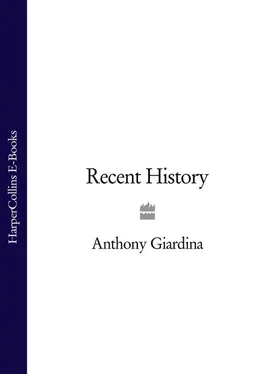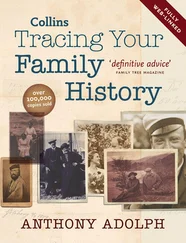A sound came from outside, but my reverie was deep enough that I did not get up to look until the sound had been going on a long time. At the base of John’s driveway, my father was lighting a cigarette and with his free hand throwing rocks. That is, he stopped to light the cigarette and then he threw the rocks. He looked calm and unperturbed, just as if he had stepped out to have a smoke, and it was only in the motion of his arm as he threw that I knew something was wrong. He was throwing the rocks very hard, very far, and with great concentration. He was trying to hit our house, across the way.
After a while, he stopped. He disappeared, walked into the dark. I could see the lit ash end of his cigarette and then nothing of him, but I suspected he had gone over to our house and was inspecting it, testing the floorboards and the beams the way he did, humming, all the while, one of the songs with which he consoled himself. “Teach Me Tonight.” “Don’t Get Around Much Anymore.” I watched, and I held the book George had given me, and at that moment, though I didn’t know why, I wanted to fling the book across the room, to mimic my father’s gesture with the rocks.
After another little while, John came out in search of him. I saw John stop at the end of his driveway. He looked to both sides, exaggeratedly, like a man in a cartoon, and like the man in the cartoon, I suspected he would choose the wrong direction. I almost shouted, from the window, to set him straight. But he chose right. When he brought my father back, ten or so minutes later, it may have been me, reading into the scene, but John had his arm around my father’s shoulders, and I saw in those shoulders an immense resistance, as though John were leading him back toward a place he had decided, in the last ten minutes, he really didn’t want to go.
Like everything else, that image disappeared, covered over by another, and another. I was in the seventh grade, and I made my good marks. Luca Carcera, beloved of the teachers. In the winter there were lakes, frozen over for skating, and I had friends. Sometimes we stayed late, skating; the sky took on, around the departed sun, a shade of deep yellow that exists in the world only when you are twelve, and disappears after. My father arrived to pick us up and stood outside the car, bundled up. “Nobody drowned, huh?” he shouted. “Nobody fell in?”
Sometimes he brought his hockey stick and came down to the ice to show us how it was done. He’d played left wing at BC and he had wonderful speed and when he turned on the ice he managed a terrific little jumping movement. I would never be as good as he was, none of us would. “Your father,” they said, the boys who were my friends, breathless and in awe.
Afterward, he patted himself and found the pack of Pall Malls in his coat pocket and smoked one. Smoke came out of his mouth, and the smoke our breath made in the cold seemed a pure imitation. The car smelled of cigarettes and, once or twice, of the presence of someone else, a body that had recently been there. It was a poor-smelling, weathery body, whosever it had been, someone who did not dress well or have the personal habits of my father, and we covered it, my friends and I, packed in with our skates. It went away. I looked out the window and saw the crust of the snow and something that flashed across my mind went away. To entertain us, my father was singing.
In the evenings, we drove to Natick, to Framingham, to visit furniture showrooms, to move among the great empty sofas and easy chairs. Or else my parents huddled in the kitchen, planning the house. “Do you want this, Dorothy, or do you want that?” my father would ask, as they studied furniture catalogs. He was only slightly impatient, even indulgent at times. Sometimes they would retreat into Italian, tender when they did that, or else angry. In the adjacent dining room, I sat writing a play about Cortés, “The Conquest of Mexico,” my assignment for school. In the scene where Cortés faces Montezuma, I had him shout, “Do you want this, or do you want that?” Meanwhile, my parents, in English, moved toward agreements: a sectional in off-white, a beige easy chair, a round kitchen table with teak chairs.
In April, we moved into the new house. The day had a ceremonial quality, measured and carefully paced, like a presentation scene in the movies, the birth of Ramses. My father held my mother’s elbow at the threshold, as if they were about to step into a lake and he was attentive to the chill she might feel. With his hands in his pockets, in his best camel’s hair coat, he inspected the rooms and nodded. The rooms were large and full of light; on the walls, the textured grass cloth shone. Before us lay a new life, shimmering and empty as the model kitchens and dining rooms in the furniture showrooms. Moving trucks had preceded us, and the movers had made mistakes. A couple of chairs, placed in the wrong room, had to be dragged across the carpet. The carpet itself was thick enough so that my father, lying down in the living room, could move his arms and leave the impress of an angel’s wings. He pulled me down and we tussled and only in a region far back in his eyes did I see signs of effort.
Later, Uncle John came. He wore an expensive raincoat and his hair was wet. He had a cigar in his mouth and one for my father. He always took a shower in the middle of the day because he sweated so much at work. His midday freshness was legendary. My mother was unpacking dishes in the kitchen, my father had gone to lie down in their room. For this, I had been given the day off from school.
“Everything good?” John called to my mother. My father came out of the bedroom at the sound, his hair mussed and standing up at the back of his head, still in the camel’s hair coat.
“Going back to work?” John asked.
“Yes.”
“So. Moved in.” John’s hands were in his pockets, he rocked back on his feet.
He offered the extra cigar to my father, but my father just looked at it. It had a pink wrapper on it, so we knew it was left over from when Emma had the baby.
“Yes. Moved in,” my father said. It sounded grim coming out of his mouth, and John stared at him a moment, annoyed.
“You?” my father asked. “Going back?”
“I’ll have a cup of coffee first, with Dorothy.”
We all gathered at the bay window to watch my father drive away. John’s eyes stayed on him a long time.
When my mother took the roast out of the oven at six, he was still not home. We were used to seeing him at 5:30, and there was less of a drive from Vanderbruek to here. At 6:30 she put the roast back in the oven to warm. Outside the window, I saw some boys cut across the lots, disappear into the frames of houses. Meola, Semenza; I knew the names already, and who would live in each of the uncompleted houses, and when I saw these boys, I didn’t think they were the ones who would live there. They were just boys looking, gawking, and I waited for them to come out.
At seven o’clock, the lights of my father’s car came around the bend and into the driveway. He entered, excited, holding a bottle of wine. “My new house,” he said, like a boy.
We ate in the kitchen; my father kept reaching up to play with the chandelier that hung over the table. “Look at that,” he kept saying, and flicked the dangling crystals of the chandelier they had chosen, one frozen winter night at Jordan’s. We had not had a better dinner in a long time, and I kept wishing that I had homework, that I had gone to school that day, so I could feel now the exquisite pang of having to leave a scene so sweet.
That night they made love. I lay in bed listening. It was a windy night and there were tree branches that tapped against the house. My father had come into my room and stood in the dark, thinking I was asleep. He had leaned against the wall with his hands in his pockets, and I didn’t think I was wrong in assuming what he was feeling was pride. Then he had gone in and made love to my mother, but the sounds tonight filled me with terror. Though I ought to have been used to them, tonight they seemed extreme, as though he were doing something to her beyond the usual. When I heard my mother cry out in that ripped-open way of hers, I went into their bedroom and stood in the doorway. I tried to fool myself by pretending what I was doing wasn’t conscious—that I was sleepwalking—and thus excusable. When my father noticed me there, he made a gasp. Then he said “goddammit.” He rose and I expected to be hit, though he had rarely done that. I had seen him naked many times but not like this.
Читать дальше












